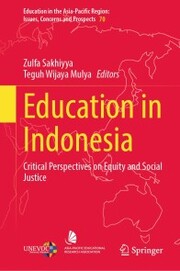This book offers a critical analysis on Indonesian education by drawing from various critical perspectives and theoretical frameworks to explore persistent challenges and social inequality problems in the education sector. Critical perspectives are important to reveal how education is not a neutral, mechanistic process of cultivating the knowledge and skills of future generation. Instead, it is a battleground in which competing visions, ideologies, discourses, religious values, and political interests struggle for dominance in a given society. In each of the sections, contributors draw upon specific case studies and employ critical theories to analyze power relations or to identify and destabilize underlying structures, dominant discourses, hegemonic knowledge, policies, or practices. Some authors also highlight data evidencing inequities, inequalities, or injustices in Indonesian education system. As a handbook, the emphasis on critical perspectives is useful to identify and evaluatethe blind spots of dominant policy discourses and their pedagogical consequences. The plurality of critical approaches also means that this book is necessarily multidisciplinary. A unique feature of this book is the fact that most authors are Indonesian academics who bring with them tacit knowledge of practices and issues. Overall, this book enriches the literature by bringing together different disciplinary perspectives such as political science, psychology, international relations, economics, and linguistics to critically examine important issues related to education in Indonesia.
Zulfa Sakhiyya is Associate Professor at the Faculty of Languages and Arts, Universitas Negeri Semarang and a Fulbright Visiting Scholar in Ohio State University in 2023. She is the Communication Director of the Indonesian Young Academy of Science (ALMI). Zulfa is a discourse analyst focusing on how knowledge is produced and represented, and published in the area. Her work has been published in journals such as Gender and Education; Globalization, Societies and Education, International Journal of Multilingualism, and Pedagogy, Culture and Society. Zulfa receives the Barr Mosenthal Awards granted by the International Literacy Association in 2022 for her literacy research in Indonesia.Teguh Wijaya Mulya is Teguh Wijaya Mulya is a senior lecturer at the Faculty of Psychology, University of Surabaya. He has a doctorate in education from the University of Auckland, New Zealand. Informed by feminism and poststructuralist theories, hisresearch has been centered around the identification and destabilisation of dominant discourses in various domains, including higher education, gender, sexuality, and religion. His work has been published in journals such as Gender and Education, International Journal for Academic Development, British Journal of Religious Education, Asian Studies Review, and Psychology and Sexuality. In 2023 he was a visiting researcher at the School of Education and Sociology, University of Portsmouth, UK.
Foreword.- Preface and Acknowledgments.- Glossary.- Introduction: Critical perspectives on Education in Indonesia.- Part I. Early Childhood Education.-Chapter 1: Governing childhood through child-development knowledge: A Foucauldian reading of Indonesian preschool policies.- Chapter 2: Rethinking School Readiness Discourse in Indonesian Early Childhood Education.- Chapter 3: The (dis)appearance of (m)others: Discourses of women in early childhood education projects in Indonesia.- Part II. Primary and Secondary Education.- Chapter 4: Constituting Literacy in Indonesian Schools: a new literacy studies perspective.- Chapter 5: Integrating Critical Pedagogy into Teachers Professional Development: the culture of power in Indonesias education system.- Chapter 6: Mind the Teaching Gaps: Opportunities to Learn Math, Science, and Reading across School Sectors in Indonesia.- Chapter 7: Attraction of Authority: Indonesian Experienceof Educational Decentralization.- Chapter 8: Vocationalizing education: why the domination of link and match paradigm between school and industry endangers students future?.- Part IV. Higher Education.- Chapter 9: Changing knowledge production in Indonesian Higher Education: Is it a bare pedagogy?.- Chapter 10: Praxizing with English language learners from underdeveloped regions in West Kalimantan.- Chapter 11: The Political Economy of the Production of Social Humanities Research: Insulating or Internationalising Indonesian Higher Education?.- Chapter 12: Who are we? Understanding the identity of casual academics.- Part V. Beyond the Structure.- Chapter 13: Pesantren in the changing Indonesia: ideology and aspired modernity.- Chapter 14: The Social Construction of Disability among Teachers of Special and Inclusive Schools.- Chapter 15: Envisaging a critical sexuality education in Indonesia: A poststructuralist offer.- Chapter 16:Courts and the Realisation of Education Rights: The Indonesian Case.- Chapter 17: Swimming against the Stream: Rationales, practices and survival strategies of homeschooling movement in Indonesia.- Chapter 18: Reconnecting Student Learning with Local Community through Community-Based Education.- Chapter 19: The future of critical perspectives for education: A socially just education system (Editors).
„E-Book“ steht für digitales Buch. Um diese Art von Büchern lesen zu können wird entweder eine spezielle Software für Computer, Tablets und Smartphones oder ein E-Book Reader benötigt. Da viele verschiedene Formate (Dateien) für E-Books existieren, gilt es dabei, einiges zu beachten.
Von uns werden digitale Bücher in drei Formaten ausgeliefert. Die Formate sind EPUB mit DRM (Digital Rights Management), EPUB ohne DRM und PDF. Bei den Formaten PDF und EPUB ohne DRM müssen Sie lediglich prüfen, ob Ihr E-Book Reader kompatibel ist. Wenn ein Format mit DRM genutzt wird, besteht zusätzlich die Notwendigkeit, dass Sie einen kostenlosen Adobe® Digital Editions Account besitzen. Wenn Sie ein E-Book, das Adobe® Digital Editions benötigt herunterladen, erhalten Sie eine ASCM-Datei, die zu Digital Editions hinzugefügt und mit Ihrem Account verknüpft werden muss. Einige E-Book Reader (zum Beispiel PocketBook Touch) unterstützen auch das direkte Eingeben der Login-Daten des Adobe Accounts – somit können diese ASCM-Dateien direkt auf das betreffende Gerät kopiert werden.
Da E-Books nur für eine begrenzte Zeit – in der Regel 6 Monate – herunterladbar sind, sollten Sie stets eine Sicherheitskopie auf einem Dauerspeicher (Festplatte, USB-Stick oder CD) vorsehen. Auch ist die Menge der Downloads auf maximal 5 begrenzt.






